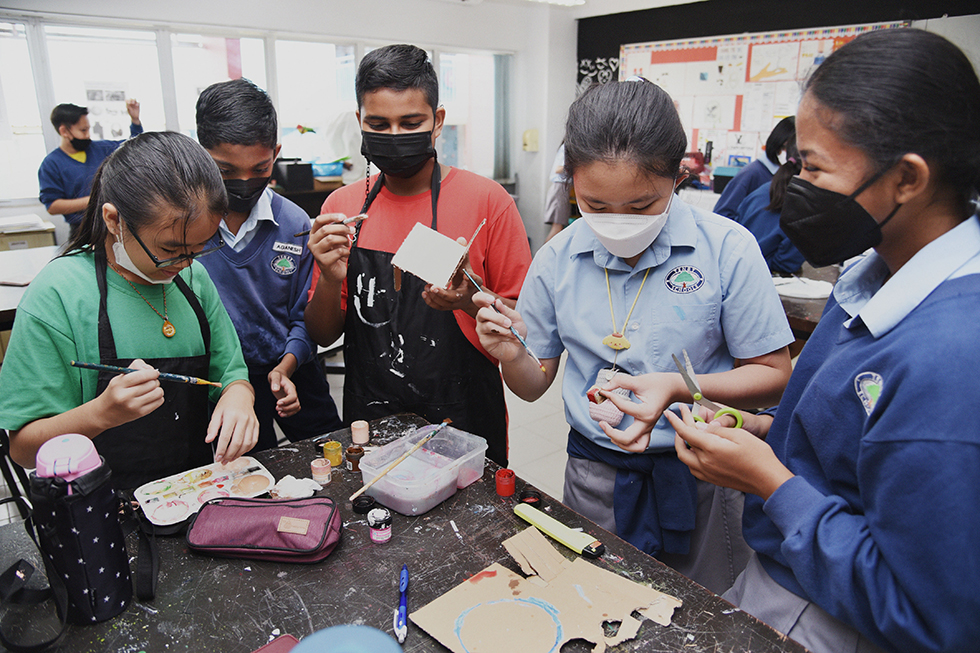Factors to Consider When Choosing an International School
by StudyMalaysia.com on November 2, 2022 | Top Stories, International School Education in Malaysia
Choosing the right International School can be challenging but opens up a new world of possibilities for families joining the school community. There is a wide range of factors to consider to ensure that, as a parent, you provide the very best for your child.
In Malaysia, International Schools have become a popular choice as they offer curriculums, life skills, support structures, and experiences that are often not provided in normal schools.
The following factors should be at the heart of the decision-making process:
1. Student Wellbeing
Look out for schools that place importance on student wellbeing
Any good school worth its mettle should have their students’ wellbeing as their top priority. Aside from providing a safe school campus for students to learn in, a good international school takes further measures to nurture not just a sense of belonging, among their students but also provides meaningful ways for them to be able to connect, build relationships collaborate, feel valued and have a sense of purpose within a happy and encouraging learning environment.
Look out for schools that put into practice methods to achieve student wellbeing
Seek out schools with an active and transparent teacher-student-parent community, where parents are encouraged to involve themselves in open dialogues with the heads of school, teachers, and school community.
Today, schools with clear safeguarding practices are a must. Understanding the great lengths and detailed processes & protocols taken by teachers, students, staff and vendors regarding the physical, mental, and emotional safety of students will help assure parents that their children will receive the quality care they deserve.
2. Approach to learning (Quality Teacher)
Look out for schools that place emphasis on teacher quality
The approach to teaching and learning is a vital factor to consider when choosing an International School for your child. Dedicated teachers who have excellent subject knowledge and pedagogical understanding, alongside passion both for their subject and for working with young people and supporting their well-being will enable your child to develop a lifelong love for learning. Rich learning cultures encourage children to be curious, to explore and learn new knowledge and skills independently, promoting a deeper and more personal understanding.
Look out for schools providing student-centric practices
Look for a school where children are encouraged to ask questions, allowed to make mistakes, then find the right solutions in a positive and encouraging environment. Shortlist schools that focus on balancing the academic, social, and emotional development of their students. 'Hard' skills, as they say, are no longer enough to help your child thrive in this modern age. Academic outcomes are no doubt important, but these should be complemented with life skills and values that are essential for the future. Social and emotional growth and development will help your child build the abilities they need to walk down their future pathways and adult life.
3. Future Pathways Into Tertiary Level
Look out for schools that offer a smooth transition into tertiary education
Parents are likely to make choices about schools for their children based on their ability to support their children in achieving the next steps towards their chosen future career path. International schools support students in applying and being accepted into, overseas universities and ensure that they receive appropriate guidance, counselling and advice so that they can make the best decision for themselves.
It is essential that the children also receive the support they need as they go through many adjustments while progressing. Ask about systems that the school has in place to allow your children to transition smoothly and happily as they move up crucial education levels or into the university of their choice.
Look out for suitable school curriculum
International schools pave the way for students to explore opportunities beyond that of a local curriculum. Many international schools prepare their students through the Cambridge IGCSEs, A-Level programme or International Baccalaureate (IB), which are globally recognised examination programmes accepted by universities around the world.
4. International-mindedness
Look out for schools with a global perspective
One of the most visible benefits of attending an International School is the opportunities that await beyond the classroom as this underpins the school’s belief in a holistic education. Character development as well as cultural exploration allow students to benefit from being part of a wider international community as these activities also serve to provide students with a global perspective that will stand them in good stead in future.
International-mindedness doesn’t simply entail an international education. It focuses on empowering and inspiring students to connect their learning to real-life. It allows students to experience the world beyond their own bubble, whether it is their local community or school grounds. International schools that offer programmes, leadership opportunities, or events that enable your child to engage with the broader world and community, to appreciate different cultures & environments, explore their interests & passions, are ideal choices.
Look out for schools providing interconnectivity with other schools
International schools that belong to a wider network or school group are great for this, as they provide your child with a ready-made global connection to a plethora of learning opportunities outside the classroom but within a safe and protected environment. This not only develops their academic abilities, but also encourages individual passions, builds connections and long-term friendships, nurtures their confidence and communication skills and their appreciation for other cultures as well.
5. Multilingualism
Look out for schools with a language-immersion approach
An international education offers the advantage of being able to learn languages in authentic everyday contexts and experience the language in familiar surroundings. Young brains are still developing, and as such, they are better able to adapt to the learning of multiple languages during these formative years. Most International Schools have English as their primary instructional language. Thus it is vital to ensure that there is an English as an Additional Language programme that suits your child’s language level.
Look out for schools with a multilingual approach
A good international school should offer at least one additional language, alongside supporting, valuing, and celebrating their native or first language.
6. External Accreditation
Look out for schools which offer standard curriculums and practices
International Schools vary in a significant number of ways, and it is important to ensure that your school of choice has external monitoring processes in place to ensure that the curriculum follows a required standard, the safety standards are being met and safeguarding practices are efficient.
Look out for schools providing external accreditations
A qualified school should include third-party accreditations to ensure its provisions are genuine and up to par with global requirements and standards set. Some accreditations to keep an eye out for include Council of International Schools (CIS) and Accreditation Service for International Colleges (ASIC) School Accreditation.
7. Tour the school and meet their academic and admissions teams
All children thrive in their own unique ways and have their own unique needs. The only way to know which school suits your child is to visit the school, tour the campus and speak with their academic and admissions teams; ask them questions; then match your findings with your child’s needs and your expectations. At the end of the day, there is no one silver bullet to determine the best international school but there is one that best suits your child.
This article is written by Becky Gray, Head of International Secondary at Tenby Schools Ipoh and Elizabeth Cloke, Regional Head of Learning at International Schools Partnership (ISP) Malaysia.
The International Schools Partnership (ISP) is a world leading international and private schools group, all of which aim to be the school of choice in their local area. ISP has 9 schools in Malaysia:
- Tenby Schools Ipoh
- Tenby Schools Penang
- Tenby Schools Setia Eco Park
- Tenby International School Setia EcoHill
- Tenby International School Tropicana Aman
- Tenby Schools Setia Eco Gardens (Johor)
- Asia Pacific Schools
- Straits International School Rawang
- Straits International School Penang
(Note: This article has been edited by the editorial team of STUDYMALAYSIA for editorial consistency)
You May Also Be Interested In...
Which pre-university programme should you choose?
![Which pre-university programme should you choose? - StudyMalaysia.com]() If you have an SPM qualification and you are planning to pursue a bach...
If you have an SPM qualification and you are planning to pursue a bach...�Thinking of an MBA?
![�Thinking of an MBA? - StudyMalaysia.com]() Have you been working a few years and feel it’s time to up your care...
Have you been working a few years and feel it’s time to up your care...SPM tips and resources
![SPM tips and resources - StudyMalaysia.com]() The SPM exam is around the corner. Don't allow yourself to lose s...
The SPM exam is around the corner. Don't allow yourself to lose s...Part 3: List of Possible Careers for You - Its Description and Important Attributes
![Part 3: List of Possible Careers for You - Its Description and Important Attributes - StudyMalaysia.com]() Now that you have a better understanding of your own personality and i...
Now that you have a better understanding of your own personality and i...So you wanna be a PR manager
![So you wanna be a PR manager - StudyMalaysia.com]() Do you love planning events? Are you good at writing? Is socializing s...
Do you love planning events? Are you good at writing? Is socializing s...Bad Exam Results? Blame it on Your Personality
![Bad Exam Results? Blame it on Your Personality - StudyMalaysia.com]() Finding out you didn't get the grades you wanted for SPM can feel...
Finding out you didn't get the grades you wanted for SPM can feel...

































